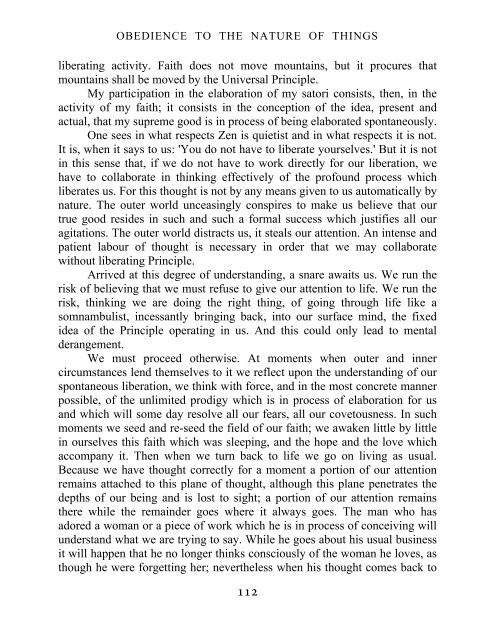The Supreme Doctrine - neo-alchemist
The Supreme Doctrine - neo-alchemist
The Supreme Doctrine - neo-alchemist
You also want an ePaper? Increase the reach of your titles
YUMPU automatically turns print PDFs into web optimized ePapers that Google loves.
OBEDIENCE TO THE NATURE OF THINGS<br />
liberating activity. Faith does not move mountains, but it procures that<br />
mountains shall be moved by the Universal Principle.<br />
My participation in the elaboration of my satori consists, then, in the<br />
activity of my faith; it consists in the conception of the idea, present and<br />
actual, that my supreme good is in process of being elaborated sponta<strong>neo</strong>usly.<br />
One sees in what respects Zen is quietist and in what respects it is not.<br />
It is, when it says to us: 'You do not have to liberate yourselves.' But it is not<br />
in this sense that, if we do not have to work directly for our liberation, we<br />
have to collaborate in thinking effectively of the profound process which<br />
liberates us. For this thought is not by any means given to us automatically by<br />
nature. <strong>The</strong> outer world unceasingly conspires to make us believe that our<br />
true good resides in such and such a formal success which justifies all our<br />
agitations. <strong>The</strong> outer world distracts us, it steals our attention. An intense and<br />
patient labour of thought is necessary in order that we may collaborate<br />
without liberating Principle.<br />
Arrived at this degree of understanding, a snare awaits us. We run the<br />
risk of believing that we must refuse to give our attention to life. We run the<br />
risk, thinking we are doing the right thing, of going through life like a<br />
somnambulist, incessantly bringing back, into our surface mind, the fixed<br />
idea of the Principle operating in us. And this could only lead to mental<br />
derangement.<br />
We must proceed otherwise. At moments when outer and inner<br />
circumstances lend themselves to it we reflect upon the understanding of our<br />
sponta<strong>neo</strong>us liberation, we think with force, and in the most concrete manner<br />
possible, of the unlimited prodigy which is in process of elaboration for us<br />
and which will some day resolve all our fears, all our covetousness. In such<br />
moments we seed and re-seed the field of our faith; we awaken little by little<br />
in ourselves this faith which was sleeping, and the hope and the love which<br />
accompany it. <strong>The</strong>n when we turn back to life we go on living as usual.<br />
Because we have thought correctly for a moment a portion of our attention<br />
remains attached to this plane of thought, although this plane penetrates the<br />
depths of our being and is lost to sight; a portion of our attention remains<br />
there while the remainder goes where it always goes. <strong>The</strong> man who has<br />
adored a woman or a piece of work which he is in process of conceiving will<br />
understand what we are trying to say. While he goes about his usual business<br />
it will happen that he no longer thinks consciously of the woman he loves, as<br />
though he were forgetting her; nevertheless when his thought comes back to<br />
112




